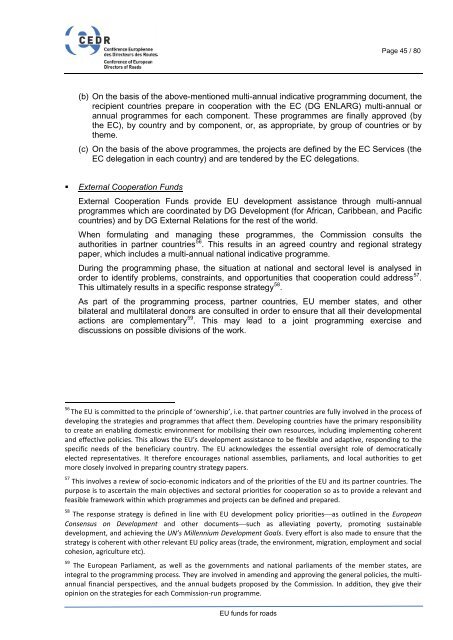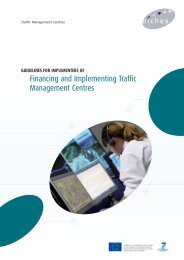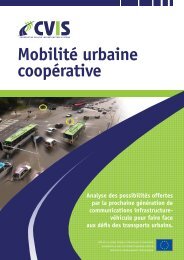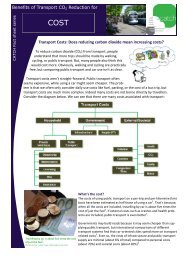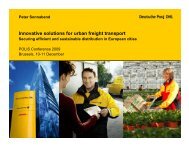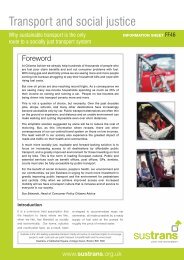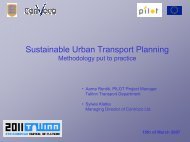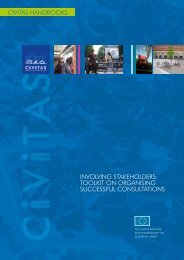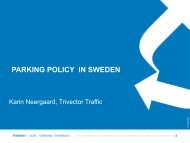EU funds for roads - CEDR
EU funds for roads - CEDR
EU funds for roads - CEDR
Create successful ePaper yourself
Turn your PDF publications into a flip-book with our unique Google optimized e-Paper software.
Page 45 / 80<br />
(b) On the basis of the above-mentioned multi-annual indicative programming document, the<br />
recipient countries prepare in cooperation with the EC (DG ENLARG) multi-annual or<br />
annual programmes <strong>for</strong> each component. These programmes are finally approved (by<br />
the EC), by country and by component, or, as appropriate, by group of countries or by<br />
theme.<br />
(c) On the basis of the above programmes, the projects are defined by the EC Services (the<br />
EC delegation in each country) and are tendered by the EC delegations.<br />
• External Cooperation Funds<br />
External Cooperation Funds provide <strong>EU</strong> development assistance through multi-annual<br />
programmes which are coordinated by DG Development (<strong>for</strong> African, Caribbean, and Pacific<br />
countries) and by DG External Relations <strong>for</strong> the rest of the world.<br />
When <strong>for</strong>mulating and managing these programmes, the Commission consults the<br />
authorities in partner countries 56 . This results in an agreed country and regional strategy<br />
paper, which includes a multi-annual national indicative programme.<br />
During the programming phase, the situation at national and sectoral level is analysed in<br />
order to identify problems, constraints, and opportunities that cooperation could address 57 .<br />
This ultimately results in a specific response strategy 58 .<br />
As part of the programming process, partner countries, <strong>EU</strong> member states, and other<br />
bilateral and multilateral donors are consulted in order to ensure that all their developmental<br />
59<br />
actions are complementary . This may lead to a joint programming exercise and<br />
discussions on possible divisions of the work.<br />
56<br />
The <strong>EU</strong> is committed to the principle of ‘ownership’, i.e. that partner countries are fully involved in the process of<br />
developing the strategies and programmes that affect them. Developing countries have the primary responsibility<br />
to create an enabling domestic environment <strong>for</strong> mobilising their own resources, including implementing coherent<br />
and effective policies. This allows the <strong>EU</strong>’s development assistance to be flexible and adaptive, responding to the<br />
specific needs of the beneficiary country. The <strong>EU</strong> acknowledges the essential oversight role of democratically<br />
elected representatives. It there<strong>for</strong>e encourages national assemblies, parliaments, and local authorities to get<br />
more closely involved in preparing country strategy papers.<br />
57 This involves a review of socio-economic indicators and of the priorities of the <strong>EU</strong> and its partner countries. The<br />
purpose is to ascertain the main objectives and sectoral priorities <strong>for</strong> cooperation so as to provide a relevant and<br />
feasible framework within which programmes and projects can be defined and prepared.<br />
58 The response strategy is defined in line with <strong>EU</strong> development policy priorities⎯as outlined in the European<br />
Consensus on Development and other documents⎯such as alleviating poverty, promoting sustainable<br />
development, and achieving the UN’s Millennium Development Goals. Every ef<strong>for</strong>t is also made to ensure that the<br />
strategy is coherent with other relevant <strong>EU</strong> policy areas (trade, the environment, migration, employment and social<br />
cohesion, agriculture etc).<br />
59 The European Parliament, as well as the governments and national parliaments of the member states, are<br />
integral to the programming process. They are involved in amending and approving the general policies, the multiannual<br />
financial perspectives, and the annual budgets proposed by the Commission. In addition, they give their<br />
opinion on the strategies <strong>for</strong> each Commission-run programme.<br />
<strong>EU</strong> <strong>funds</strong> <strong>for</strong> <strong>roads</strong>


